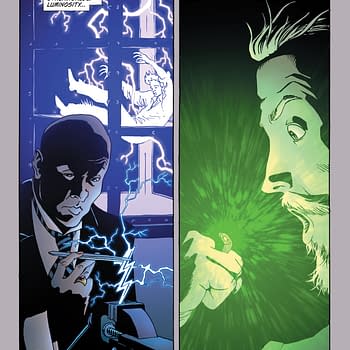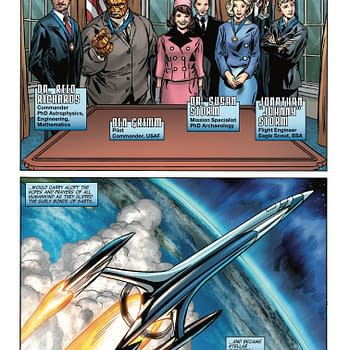Posted in: Comics, Recent Updates | Tagged: brand new day, Comics, dan slott, entertainment, Marvel Comics, spider-man, stan lee
Millennial: What It Means That Spider-Man Is 28 Years Old
By Bart Bishop
Coined by William Strauss and Neil Howe in 1987, the term "millennial" refers to anyone born between the years 1982 and 2004, give or take a few years. In recent times this term has taken on a negative connotation, with the "Lost Generation" moniker being applied to the tech-obsessed, apathetic slackers stuck living in their parents' basements. Counted among their number is Spider-Man, even if that wasn't always true. As established in 2006's Civil War, Peter Parker declared he had become a super hero when he was 15. Not long before that the Marvel Knights Spider-Man series, also written by Mark Millar, saw Peter attend his high school reunion, and just to confirm that 2007's "One More Day" didn't affect ages, last year's Amazing Spider-Man #1 confirmed Peter getting bit by the radioactive spider as 13 years ago, putting him at age 28 and therefore a millennial. But does he reflect the stereotypes of his generation or defy them, and what did it mean for him when he was a baby boomer and a Generation Xer?

Spider-Man has, for the most part, gone against the trends of the times in the past. While baby boomers are defined by the prosperity of a post-WWII economy, Peter Parker's life has always been full of financial strife. At first left ambiguous, the absence of Peter's parents hinted at a troubled past, the kind of taboo background that wasn't discussed in "polite circles" at the time. When Uncle Ben was killed, therefore, the Parker household was left in shambles, forcing Peter to grow up quickly and make money to support Aunt May. He essentially missed out on being a teenager, and even the eponymous name Spider-Man hints at an individual striving to be perceived as an adult rather than basking in the immortality of youth.
This term was a new invention of the mid-20th century that signified a unique mindset between childhood and adulthood, and was accompanied by a rampant distrust of authority. Oddly Spider-Man straddled that fine line: he didn't fit in with his peers in high school, even dating Betty Brant whom he meet at the Daily Bugle, but the Bugle itself is headed by the ultimate symbol of adult authority, J. Jonah Jameson, who is always trying to bring Spider-Man down. At the same time, however, as Peter graduated into college he found himself perplexed by a common sight on campuses at the time: protesters. Most notably, Amazing Spider-Man #68 (1969) has Spider-Man dumbfounded at the angry crowds he encounters and not at all sympathetic, perhaps more a glimpse into writer Stan Lee's psyche, bewildered and trying to avoid controversy.


Once again he seemed to be going against the grain of his age group, proving successful and accomplished and oblivious to a new wave of activism in the wake of 2011's Occupy Wall Street. This changed in 2012, however, when Dr. Octopus took over Spider-Man's body, the culmination of storylines writer Dan Slott had been setting up. This continued on into The Superior Spider-Man series, in which the middle-aged Doc Ock, himself more than likely a baby boomer making for ironic commentary as a member of Peter's former age bracket took the opportunity to return to school and receive his doctorate, open his own business and vastly expand on his crime fighting with drones and henchmen, all the while criticizing Peter for his lack of drive and follow-through. Although the ultimate message of the series is that Peter's strength is in his willpower and heart, Slott hasn't shied away with the new Amazing Spider-Man series from showing the newly resurrected Peter shirking responsibility as CEO of Parker Industries to run off on flights of fancy as Spider-Man and lust after new fellow spider person Silk, showing how he truly is a millennial, at least for now.

Editor and teacher by day, comic book enthusiast by night, Bart has a background in journalism and is not afraid to use it. His first loves were movies and comic books, and although he grew up a Marvel Zombie he's been known to read another company or two. Married and with a kid on the way, he sure hopes this whole writing thing makes him independently wealthy someday. Bart can be reached at bishop@mcwoodpub.com.















